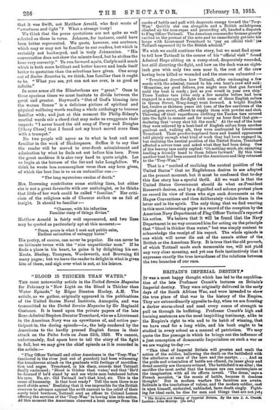"BLOOD IS THICKER THAN WATER."
THE most noteworthy article in the United Service _Magazine for February is "New Light on the Blood is Thicker than Water Episode," by Edgar Stanton Maclay, A.M. The article, as we gather, originally appeared in the publications of the United States Naval Institute, Annapolis, and was transmitted to the United Service Magazine by Sir Reginald Cuatauce. It is based upon the private papers of the late Rear-Admiral Stephen Decatur Treno hard, who as a Lieutenant in the American Navy was an eyewitness of, and active par- ticipant in, the daring episode—i.e., the help rendered by the Americans to the hardly pressed English forces in their attack on the Peiho forte on June 25th, 1859. We cannot, unfortunately, find space here to tell the story of the fight in full, but we may give the chief episode as it is recorded in the article :— "Flag Officer Tattnall and other Americans in the Toey-Wan • (anchored in the river just out of gunshot) had been witnessing the treacherous attack on the gunboats with feelings of mortifies, tion and anger. Trenohard, in his diary, records that Tattnall finally exclaimed ; ' Blood is thicker than water,' and that "He'd be damned it he'd stand by and Bee white men butchered before his eyes. No, sir: Old Tattnall isn't that kind, sir. This is the cause of humanity. Is that boat ready? Tell the men there is no need of side arms.' Realizing that it was impossible for the British reserves to advance against the swift current to the relief of their sorely tried brethren, Tattnall sent an officer to Colonel Lemon offering the services of the • Toey-Wan • in towing him into action. At this moment the Americana observed a boat emerge from the smoke of battle and pull with desperate energy toward the • Toey- Wan.' Quickly she Inn alongside and a British midshipman climbed up the man-ropes and proceeding aft, handed a dispateh to Flag Officer Tattnall. The American commander became greatly excited on the perusal of the note and he immediately got into his barge with Lieutenant Trenchard to 'pay an official visit' (se Tattnall expressed it) to the British admiral."
We wish we could continue the story, but we mast find apace to tell bow Tattnall in the course of his "official visit" found Admiral Hope sitting on a camp-stool, desperately wounded, but still directing the fight, and how on the deck was an eight- inch gun with only two men near it, the rest of the crew having been killed or wounded and the reserves exhausted ;— "Trenchant describes how Tattnall, after exchanging a few words with the admiral, turned to his own boat's crew and said: 'Meantime, my good fellows, you might man that gun forward until the boat is ready ; just as you would in your own ship.' These Yankee tars (who only a few months before had been engaged in a savage fist-fight with some of these English sailors in Queen Street, Hong-kong) went forward. A bright English lad, twelve or thirteen years old (one of the few survivors of the original gun crow), offered to supply them with powder and shot Throwing off their superfluous clothing the Yankee tars entered into the fight in earnest and for nearly an hour fired that gun—. declaring that • every shot hit the mark.' At the end of the hoar they were relieved by a boat-load of English sailors from another gunboat and, walking aft, they were confronted by Lieutenant Trenchard. Their powder-begrimod faces and heated appearance told plainly enough what kind of work they had been engaged in, but realizing the neutral position of the United States, Trenchard affected a severe tone and asked what they had been doing. One of the brawny tars coolly replied: 'Oh nothing much, sir, excepting lending a friendly band to them fellers forward.' By this time another boat had been secured for the Americans and they returned to the ' Tony-Wan: " That is a " method of realizing the neutral position of the United States" that no Englishman desires to see adopted at the present moment, but it must be confessed that to-day this fine story has a special thrill. All we want is that the United Staten Government should do what ex-President Roosevelt desires, and by a dignified and solemn protest place on record its view of those who sign such documents as the Hague Conventions and then deliberately violate them in the letter and in the spirit. The only thing that we find wanting in this most interesting paper is a record of the reception by the American Navy Department of Flag Officer Tattnall's report of his notion. We believe that it will be found that the Navy Department in no way censured him for acting on the principle that "blood is thicker than water," but was simply content to acknowledge the receipt of his report. The whole episode is one which will never die out of the annals either of the British or the American Navy. It is true that the old proverb, of which Tattnall made such memorable use, will not yield any very clear meaning, and yet one feels instinctively that it expresses exactly the true inwardness of the relations between the two branches of our race.






































 Previous page
Previous page